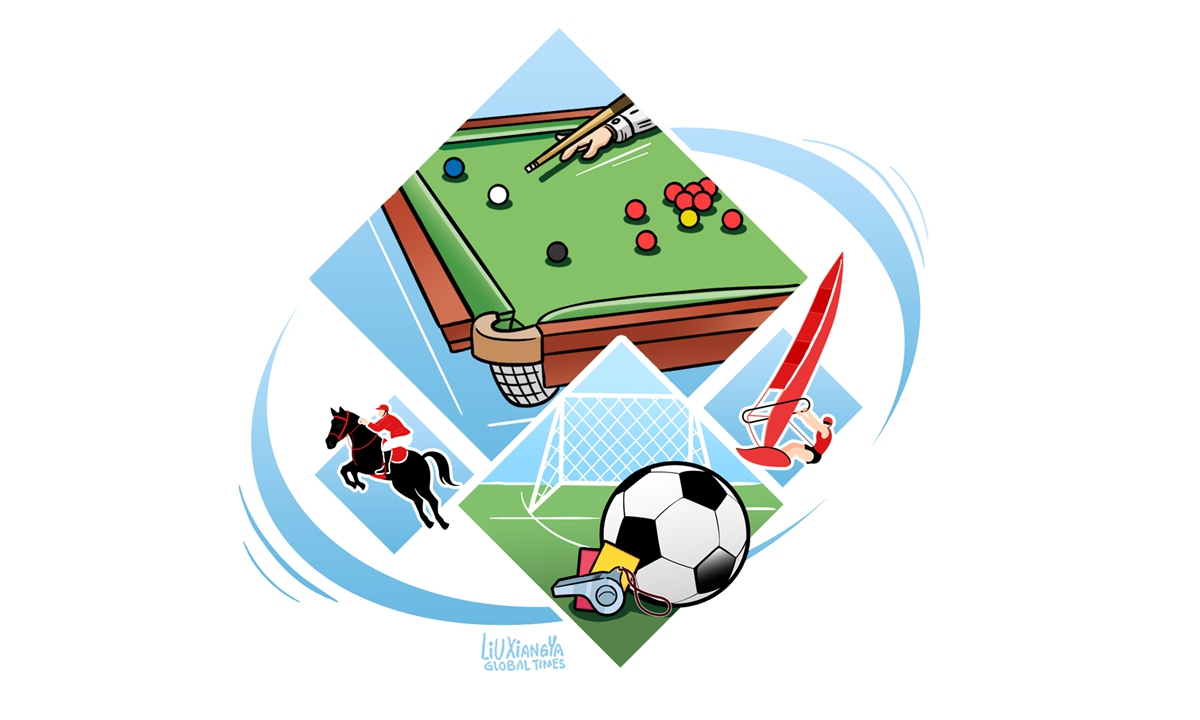Illustration: Liu Xiangya/GT
The recent news that UK snooker star Ronnie O’Sullivan has become a Hong Kong resident has stirred discussion among his vast fan base in the Chinese mainland, with many expressing excitements that they may see more of the “Rocket” at Chinese events.
For years, O’Sullivan has been one of the most celebrated figures in snooker, and China, with its strong enthusiasm for the sport, has proven to be one of his most devoted markets. His decision comes just days ahead of the 48-year-old’s participation in the International Championship in Nanjing, Jiangsu Province, this week.
His move is not just a career milestone but it’s a reflection of the expanding cultural and sporting exchanges between the UK and China, which hold great promise for fans and athletes as well as sports organizations.
“I probably do about 70 percent of my work in China and Asia now,” O’Sullivan said during a press conference for the Macao Snooker Masters, noting his career has aligned with the popularity of snooker in China.
For the UK, these expanding ties to Chinese sports fans represent a strategic opportunity.
As China’s large population and substantial market fuel a heightened demand for sports engagement, British sports icons and organizations are increasingly drawn to China. With ticket sales, merchandise and sports training programs, China’s sports sector is becoming an appealing frontier for their expansion.
O’Sullivan’s choice to establish a base in China signals a commitment to deepening his connection with his Chinese fans. But he’s not the only UK snooker legend building a presence in China.
British players like John Higgins and Stephen Hendry actively engage with Chinese fans on social media, where they post videos, share experiences and connect with their fans. This presence has helped them cultivate deeper connections with Chinese fans, enhancing their visibility and influence.
On the other hand, many top Chinese players have traveled to the UK for training and competitions, seeking to improve their game in the birthplace of snooker. Zhang Anda, who claimed the 2023 International Championship title, and Bai Yulu, the reigning women’s world champion, are among the Chinese snooker players who spent significant time in the UK refining their skills. Their journeys underscore the mutual exchanges in snooker, where Chinese and British athletes benefit from each other’s expertise and training environments.
This doesn’t only happen in snooker, but in other sports as well.
In soccer, the English Premier League (EPL) has also set ambitions to grow its footprint in China.
In October, the EPL opened an office in Beijing to support the continued growth of the league and its clubs. This move was accompanied by a Memorandum of Understanding with the Chinese Football Association (CFA) to develop soccer at both the elite and grassroots levels. Through this partnership, the EPL and the CFA aim to promote programs that support player, coach, and referee development across China, building a foundation for long-term growth.
The EPL’s influence, along with the high-profile club names in China such as Manchester United, Manchester City, Liverpool, Arsenal and Chelsea, is already substantial.
Since 2009, the league has delivered coaching programs across 28 Chinese cities, training over 6,300 grassroots coaches, referees, and teachers. From rural communities in Southwest China’s Guizhou Province to bustling urban centers, the EPL has provided soccer expertise to Chinese communities, helping to nurture a new generation of soccer enthusiasts and professionals.
With the UK’s rich history in sports organization, athlete development, and event management, British institutions are well-equipped to contribute to China’s ambitions of becoming a soccer powerhouse. The increased cooperation between the EPL and the CFA reflects a shared vision for soccer’s future in China, with benefits for both sides.
British sports institutions have long played a role in supporting Chinese athletes across various sports. Two notable examples are Olympic gold medalist Xu Lijia and equestrian Hua Tian, both of whom trained in the UK.
Xu, a sailor, honed her skills in British facilities that have produced top-tier sailors. Meanwhile, Hua Tian, China’s first Olympic equestrian, has not only trained in the UK but also promoted equestrian sports in China, helping to introduce British training methodologies to Chinese riders. Their success stories showcase the ongoing exchanges between UK mentors and Chinese athletes, which have benefitted both parties.
The UK’s extensive experience in sports, especially in terms of coaching and infrastructure, has proven invaluable for Chinese athletes aiming to compete on the international stage. In turn, Chinese athletes bring new perspectives and dedication, enriching British sports communities. This mutually beneficial relationship has deepened over time, creating a foundation of shared respect and collaboration.
The growing visibility of British sports stars and organizations in China underscores a broader potential for cooperation across multiple sports.
For British athletes, coaches, and clubs, China represents an expanding market with fans eager for interaction and engagement. This enthusiasm translates into commercial opportunities as well, with British sports products, coaching programs, and sports tourism experiences finding ready audiences in China.
For Chinese fans and athletes, the presence of UK sports figures means greater access to international expertise and chances to elevate their skills. Chinese snooker fans, for instance, can now follow O’Sullivan more closely, experiencing his prowess in tournaments on home soil.
Whether through snooker, soccer or any other disciplines, these collaborations point to a future of shared knowledge, mutual respect and a deeper cultural connection. By engaging more actively in each other’s sports ecosystems, China and the UK could lay the groundwork for a collaborative sports landscape that enhances understanding and appreciation between fans and athletes from both countries.
The author is a reporter with the Global Times. life@globaltimes.com.cn

